Home Tags Posts tagged with "Syria"
Syria
French authorities have arrested four people have in the Paris region and southern France on suspicion of recruiting militants to fight in Syria.
The raids came a day after it emerged a Frenchman was being held by police investigating the murder of three people at the Brussels Jewish Museum.
Mehdi Nemmouche, 29, was arrested at a station in Marseille on Friday.
Prosecutors say he has claimed responsibility for the attack and spent more than a year in Syria.
Interior Minister Bernard Cazaneuve told Europe 1 radio on Monday: “There are people who recruit jihadists. There are as I’m speaking arrests being made.”
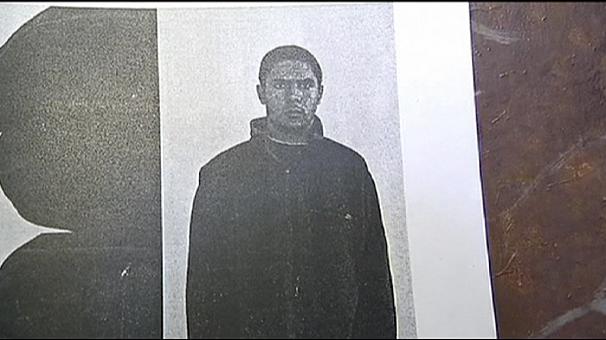
Mehdi Nemmouche was arrested at a station in Marseille on Friday
“We are acting everywhere. There will be no respite in the fight against terrorists.”
There is no suggestion of a link between the four arrests on Monday and the detention of Mehdi Nemmouche during a random check on a coach arriving from Amsterdam in southern France on Friday.
However, Mehdi Nemmouche is said to have had links with radical Islamists and served five years in jail in France for robbery before being released in December 2012.
When he was arrested, he had with him a Kalashnikov rifle and a handgun believed to have been used in the attack, the Paris prosecutor said.
Mehdi Nemmouche was also said to have had a white sheet emblazoned with the name of the Islamic State of Iraq and the Levant, a jihadist group fighting in Syria, and a camera with a 40-second video showing the two guns and a voice recording, claiming responsibility for the killings.
Speaking on French radio station RTL on Monday, the head of French Jewish association CRIF, Roger Cukierman, called for more resources to be given to the foreign intelligence service, the DGSE, to track militants returning to France from Syria.
He feared “they would become 700 time bombs when they return”, referring to the estimated number of French-born jihadists in Syria.
Belgium has requested Mehdi Nemmouche’s extradition from France and police have to decide whether to extend his detention until Thursday.
Three people died when a gunman opened fire at the museum in the busy Sablon area of the Belgian capital on May 24. They were an Israeli couple in their 50s, and a French female volunteer.
A Belgian man, believed to be an employee of the museum, was critically injured.
[youtube PTeTLWALYcQ 650]
The US state department has confirmed that a US citizen carried out a suicide bombing against Syrian troops in Idlib on Sunday.
The rebel al-Nusra Front said the man conducted the bombing on their behalf. It was one of four attacks carried out in the northern city of Idlib that day.
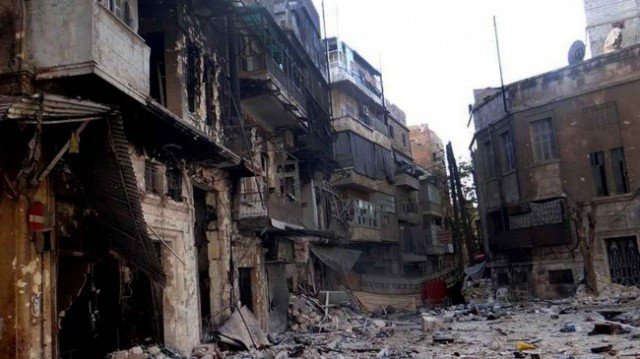
The US state department has confirmed that a US citizen carried out a suicide bombing against Syrian troops in Idlib
It is thought to be the first suicide attack by a US citizen in the conflict.
More than 100,000 people have been killed in the battle between forces loyal to Syrian President Bashar al-Assad and those opposed to his rule.
“I can confirm that this individual was a US citizen involved in a suicide bombing in Syria,” state department spokeswoman Jennifer Psaki said.
The man was believed to be Moner Mohammad Abu-Salha, she said.
The department was “concerned about the flow of foreign fighters in and out of Syria”, Jennifer Psaki added.
The al-Nusra Front, a militant Islamist group that has pledged allegiance to al-Qaeda, said the man used a truck carrying explosives to conduct the attack.
The Syrian Observatory for Human Rights said dozens of soldiers were killed by the series of bombings on Sunday, AFP news agency reported.
[youtube ZLcrdRsMhtg 650]
A mortar attack on an election rally in support of President Bashar al-Assad has killed at least 20 people in southern Syria, state media and activists say.
The attack happened as Bashar al-Assad supporters gathered in a tent in the city of Daraa on Thursday evening. President Bashar al-Assad was not at the event.
At least 30 people have been injured, Syrian Observatory for Human Rights reports.
Syrians are due to vote on June 3 in an election branded a sham by the West.
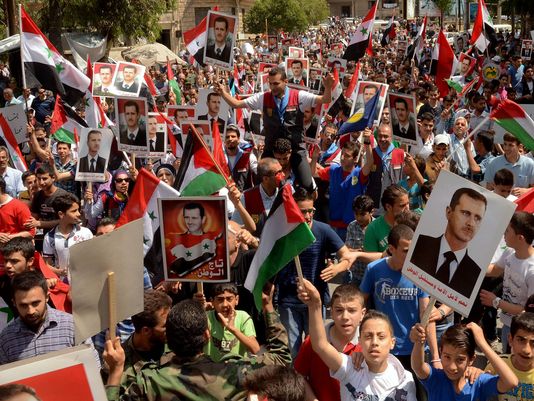
President Bashar al-Assad is widely expected to secure a third seven-year term in office after June 3 elections
President Bashar al-Assad is facing two other challengers, but he is widely expected to secure a third seven-year term in office – despite a brutal civil war now in its fourth year.
Thursday’s attack happened in the al-Matar district of Daraa, said the Observatory, which relies on reports from a network of activists on the ground.
It said the strike was carried out by an Islamist rebel brigade, and killed 11 civilians – including one child – and pro-government militiamen.
The attack “is a clear message from rebels to the regime that there is not one safe area in which to hold the election”, the Observatory’s director Rami Abdel Rahman told the AFP news agency.
This is the first time in decades that Syria is holding a multi-candidate presidential election.
Previous presidential terms have been called through a referendum with just one member of the Assad family on the ballot paper.
However, the other two candidates are not widely known and have been unable to campaign on an equal footing with the president, correspondents say.
[youtube GaQkE6RKVZE 650]
Two Jordanian journalists having a televised debate about the civil war in neighboring Syria literally turned — and overturned — the desk on each other during an on-air brawl.
Journalists Shaker al-Johari and Mohammad al-Jayousi were debating the conflict on Jordan’s Seven Stars program on Thursday.
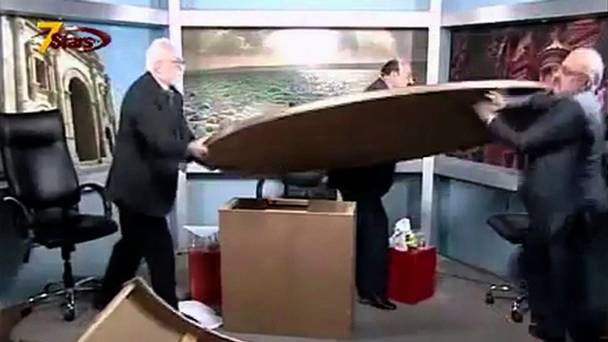
Mohammad al-Jayousi accused Shaker al-Johari of supporting the revolution in Syria, and was in turn accused of backing President Bashar al-Assad in exchange for money
Mohammad al-Jayousi accused Shaker al-Johari of supporting the revolution in Syria, and was in turn accused of backing President Bashar al-Assad in exchange for money.
The two men, obviously carried away by the debate, stood up and grabbed the edge of the studio table they had been seated at, and tried to fight each other.
In the scuffle, the top of the table broke off and the rest of it toppled as the moderator and studio workers tried to stop the fight and finally separated the two journalists.
[youtube 2edtLzQeMMY 650]
Carlton Citadel Hotel and several other buildings have been destroyed by a huge explosion in the northern Syrian city of Aleppo, state media and activists report.
Rebel fighters are believed to have detonated a bomb placed in a tunnel beneath the Carlton Citadel Hotel, near the city’s medieval citadel and souk.
Opposition activists said that government troops were based there and that a number had been killed.
Both sides have been trying to end a long-standing stalemate in the city.
In recent weeks, rebels have been trying to advance on areas where government forces are entrenched, while rebel-held areas of Aleppo have come under fierce aerial bombardment since mid-December.
The state news agency, Sana, reported that “terrorists” had blown up tunnels they had dug underneath archaeological sites in the Old City.

Carlton Citadel Hotel and several other buildings have been destroyed by a huge explosion in the northern Syrian city of Aleppo
Preliminary reports said the hotel had suffered “huge damage”, it added, without saying if there had been any casualties.
The Carlton Citadel is situated inside a 150-year-old building that faces the entrance of the 13th-Century citadel, which along with the rest of the Old City is a UNESCO World Heritage Site.
The Syrian Observatory for Human Rights, a UK-based activist group, and the opposition Shaam News Network (SNN) said it was being used by government forces.
The remote detonation of a large quantity of explosives placed in the tunnel by the Islamic Front had destroyed the hotel and caused the collapse of several nearby buildings, the Observatory said.
A number of security forces personnel and militiamen loyal to President Bashar al-Assad were believed to have been killed, it added.
Photographs and video published online purported to show the moment of the blast, with a cloud of smoke rising from the scene.
A statement from the Islamic Front said its fighters had “leveled the Carlton Hotel barracks in Old Aleppo and a number of buildings near it, killing 50 soldiers”. It did not say how it knew how many soldiers died.
The front lines have moved little in more than two years of fighting, though it seems the rebels have made a few incremental gains in recent months.
Meanwhile, hundreds more people are expected to be evacuated from their last remaining rebel stronghold in the heart of Homs.
Almost 1,000 rebel fighters and their relatives were driven in buses from the Old City to opposition-held territory north of Homs on Wednesday.
Homs Governor Talal al-Barazi told Syrian state television on Wednesday that Homs would be declared a “secure” city once the withdrawal was complete and the army had moved in.
The withdrawal is part of a deal that will also see rebels release dozens of captives and ease sieges of two predominantly Shia towns in the north.
[youtube C8NfYgU53Xk 650]
Two suicide attacks in the Syrian province of Hama killed at least 18 people, including 11 children, state media has reported.
It said the “terrorist explosions” took place in Jibrin – north-east of Hama city – and al-Humeiri.
The villages are under the control of the government.
The attack comes days after scores of people were killed and injured in explosions in government-controlled parts of the central city of Homs.
There has so far been no claim of responsibility for the bombings, correspondents say, but al-Qaeda affiliated rebels of Al-Nusra Front have carried out several car bombings in recent weeks.
Human rights groups say that both the government of President Bashar al-Assad and rebels fighting to depose him are killing civilians.
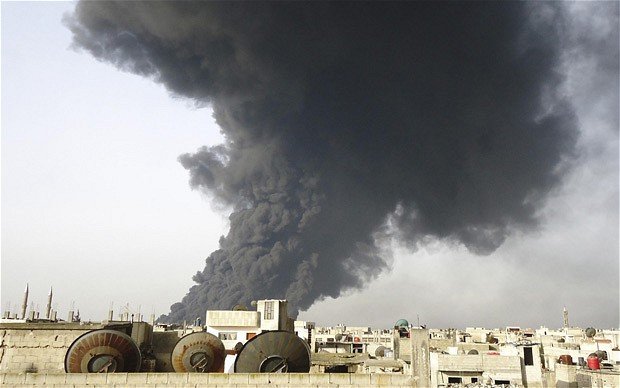
Human rights groups say that both the government of President Bashar al-Assad and rebels fighting to depose him are killing civilians (photo Reuters)
Hama saw some of the largest demonstrations against Bashar al-Assad in the first months of the Syrian uprising after March 2011.
In late summer 2011, security forces stormed the city and have maintained control ever since.
Hama’s main city occupies a significant place in the history of modern Syria.
In 1982, then-President Hafez al-Assad, father of Bashar, sent in troops to quell an uprising by the Sunni opposition Muslim Brotherhood. Tens of thousands were killed and the city flattened.
The violence in Hama province comes as the government subjects rebel-held areas in the northern city of Aleppo to fierce aerial bombardment as its forces try to end a long-standing stalemate in the city.
On Thursday at least 33 people were killed in an air strike on a market in the northern Halak district of the city.
The strike outraged The United Nations Children’s Fund (UNICEF) which described it as the “latest wave of indiscriminate attacks perpetrated against schools and other civilian targets” across Syria.
At least 12 people have been killed and dozens more wounded in a mortar attack on a technical institute in central Damascus, Syrian state media say.
Four mortar shells struck the mainly Shia Shaghour neighborhood of the city, police told the Sana news agency.
Two of the shells hit the Badr al-Din al-Hussein technical institute.
The attack comes a day after President Bashar al-Assad registered to stand for re-election defying calls to step down as a way of ending Syria’s civil war.
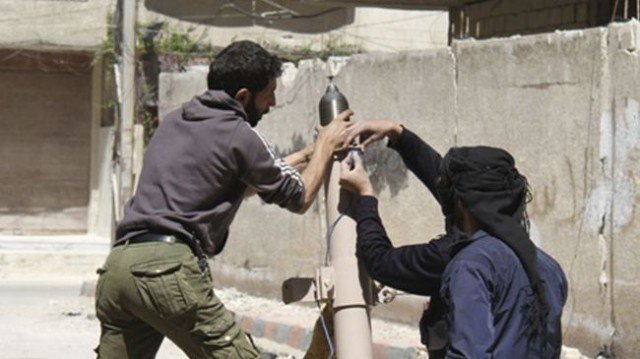
Four mortar shells struck the mainly Shia Shaghour neighborhood of Damascus
Bashar al-Assad’s forces have pushed back rebels from many of their strongholds around the capital, but residents say they have responded by increasing the number of rocket and mortar attacks in the centre of the city.
“Twelve citizens were killed and 50 others wounded by terrorists who targeted the Shaghour neighborhood,” Sana reported.
The word “terrorists” is used by the Syrian authorities to describe all those seeking to depose President Bashar al-Assad’s government.
The Syrian Observatory for Human Rights has also reported the mortar attack, saying that the number of fatalities is expected to rise.
It says that the Badr al-Din al-Hussein technical institute is an Islamic law studies centre, with students as young as 14.
More than 150,000 people are believed to have been killed in the three-year civil war.
Millions of people have fled their homes as fighting shows no sign of easing. The UN says that almost 3.5 million civilians are being denied vital aid, including medicine and medical care.
A group of prominent lawyers and academics has urged the UN in an open letter to deliver aid into Syria with or without the government’s consent.
The letter, signed by 35 legal experts, says permission for aid is being arbitrarily withheld.
A UN resolution adopted in February called for all sides in the conflict to allow unrestricted humanitarian access.
[youtube zhXWBeVb9As 650]
Syria’s government and opposition forces have accused each other of using poison gas in an attack on Kafr Zita village on Friday.
State TV said the jihadist Nusra Front group launched the attack on Kafr Zita in Hama province, killing two people and injuring dozens of others.
Meanwhile opposition groups quoted doctors as saying that an attack by regime planes led to suffocation and poisoning.
There was no independent verification of either of the claims.
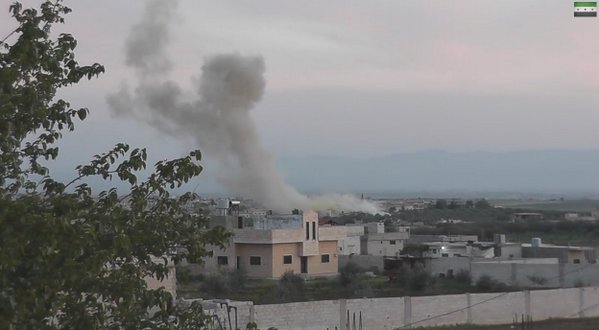
Syria’s government and opposition forces have accused each other of using poison gas in an attack on Kafr Zita village on Friday
“Regime planes bombed Kafr Zita with explosive barrels that produced thick smoke and odors and led to cases of suffocation and poisoning,” said Rami Abdel Rahman, from the Syrian Observatory for Human Rights.
State-run television blamed the attack on the Nusra Front and said they had information that the jihadist group was planning to attack two more towns.
“There is information that the terrorist Nusra Front released toxic chlorine… leading to the death of two people and causing more than 100 people to suffer from suffocation,” it said.
In a separate incident, the Al-Arabiya TV news network also reported on Friday that there were a number of cases of suffocation in Harasta, a northeastern suburb of Damascus.
An opposition group was quoted by the news channel as saying the incident came “after the regime bombarded it with poisonous gas.”
In August last year, a chemical attack near Damascus killed hundreds of people.
Syria agreed under threat of US military action to turn over its chemical weapons stockpile for destruction.
[youtube KFjJxVike94 650]
Spanish journalists Javier Espinosa and Ricardo Garcia Vilanova – kidnapped in Syria six months ago by radical Islamist rebels – have been released.
Spanish newspaper El Mundo said its Middle East correspondent, Javier Espinosa, had phoned the newsroom to say that he had been freed along with photographer Ricardo Garcia Vilanova.
Javier Espinosa said they had been handed over to Turkish soldiers.
Scores of journalists are believed to have been kidnapped or killed by rebel fighters in Syria.
Javier Espinosa and Ricardo Garcia Vilanova were seized by the Islamic State of Iraq and the Levant (ISIS) near the Turkish border in September 2013.

Javier Espinosa and Ricardo Garcia Vilanova were seized by the ISIS rebels near the Turkish border in September 2013
El Mundo said at the time the two journalists had been trying to leave Syria at the end of a two-week reporting mission when they were taken.
Four members of the Free Syrian Army – the main Western-backed rebel group – who were protecting them were also captured but later released.
The Spanish daily said the kidnapping was initially kept quiet at the request of the men’s families.
Many kidnappings have been played down in the hope of aiding negotiations.
The journalists are expected back in Madrid on Sunday, El Mundo said.
In December, 13 major international news organizations signed a letterurging Syrian rebel groups to stop kidnapping journalists, and to free those who are currently held.
Correspondents say ISIS assumes that all foreign journalists and aid workers in Syria are spies and has issued orders to arrest them.
The high risk of kidnapping has made many rebel-held areas of Syria no-go areas for most foreign journalists.
The Free Syrian Army’s political wing – the Syrian National Coalition – says it is committed to protecting journalists, and securing the release of hostages.
Javier Espinosa has been a Middle East correspondent for El Mundo since 2002 and is based in Beirut.
Ricardo Garcia Vilanova has worked for various news outlets including the New York Times, the Washington Post and the AFP news agency.
[youtube 09dhPIWFRbk 650]
Turkey shot down a Syrian military jet it says violated its airspace, but Damascus calls this “blatant aggression” and says the jet was over Syrian territory.
PM Recep Tayyip Erdogan says its armed forces have shot down a Syrian military jet which had violated its airspace.
He warned such action by Syria merited a “heavy response”.
But Syria accused Turkey of “blatant aggression”, saying the plane had been over Syrian territory at the time.
The incident reportedly occurred in an area where Syrian rebels and government forces have been fighting for control of a border crossing.
Turkey and Syria – once allies – have more than 500 miles of common border.
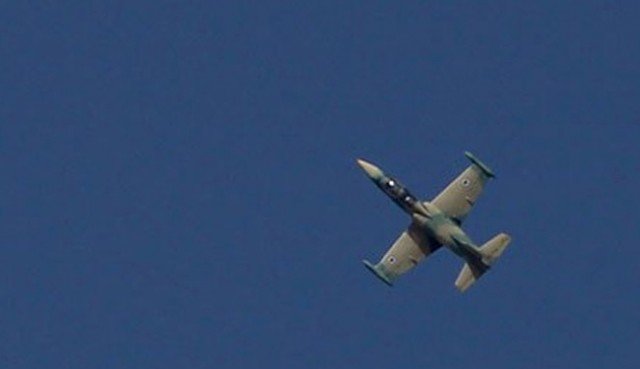
Turkey shot down a Syrian military jet it says violated its airspace
The two countries have been on opposing sides in Syria’s war since October 2011 and the two sides have been involved in occasional skirmishes and confrontations
However neither side is interested in a direct, sustained, open war or conflict between the two countries.
Speaking at a rally of supporters, Recep Tayyip Erdogan congratulated his air force on its actions on Sunday.
“A Syrian plane violated our airspace. Our F-16s took off and hit this plane. Why? because if you violate my airspace, our slap after this will be hard,” he said.
A Syrian military source, quoted by state television, said Turkish air defenses had shot down a Syrian jet as it attacked rebels on Syrian territory – an act of “blatant aggression”.
The Syrian Observatory for Human Rights said initial reports from the area suggested the plane came down on the Syrian side of the border.
“Turkish air defenses targeted a Syrian fighter bomber as it struck areas of the northern province of Latakia. The plane caught fire and crashed in Syrian territory,” the Observatory said.
According to one report, the plane’s pilot was able to eject.
[youtube E2vOg7gbYQc 650]
Israel has attacked several Syrian military sites in retaliation for a bombing that wounded four of its troops in the occupied Golan Heights.
Among the targets were a headquarters, a training facility and artillery batteries, the Israeli military said.
The Syrian army had “aided and abetted” the attack on a patrol near the ceasefire line on Tuesday, it added.
There has been no comment yet on the air strikes from Syria and it is not clear if there were any casualties.
The Israeli air force has conducted several aerial attacks on Syria since the uprising began three years ago.
Those air strikes are believed to have prevented the transfer of stockpiles of rockets from the Syrian government to Hezbollah, the Lebanese Shia Islamist movement that supports President Bashar al-Assad.

Israel has attacked several Syrian military sites in retaliation for a bombing that wounded four of its troops in the occupied Golan Heights
The choice of targets demonstrates that Israel is clearly blaming Syrian government forces, and not rebel fighters or units of Hezbollah for the attack on its patrol.
Israel has used artillery against Syrian targets on the Golan to respond in previous incidents, but its use of military aircraft on this occasion raises the incident to a more significant level.
At the start of a cabinet meeting on Wednesday, Israeli PM Benjamin Netanyahu warned that his country would act “forcefully” to defend itself against any attack.
The Golan Heights, a rocky plateau in south-western Syria, has a political and strategic significance that belies its size.
Israel seized the region from Syria in the closing stages of the 1967 Middle East War, and thwarted a Syrian attempt to retake it in 1973.
The two countries remain technically in a state of war, and UN observers are deployed to monitor a 44-mile-long demilitarized zone.
On Tuesday, the four Israeli soldiers were wounded, one of them seriously, when an explosive device was detonated as they approached the fence demarcating the demilitarized zone.
[youtube A5xUnLfXx_4 650]
Syrian rebels have released a group of Greek Orthodox nuns, who were kidnapped in the Christian town of Maaloula in December.
The 13 nuns and their three helpers were said to have been freed as part of a prisoner exchange.
The women have been taken to the town of Judaydat Yabus on the Syrian-Lebanon border, Lebanese state media reported.
Rights groups say kidnappings by both rebel groups and government forces have become increasingly common.
The capture of the nuns had raised fears that Christians were becoming a target for the rebels.
Opposition fighters, including members of the al-Qaeda-linked al-Nusra Front, seized the women from the Greek Orthodox convent of Mar Takla when fighters overran Maaloula, about 40 miles north-east of Damascus, in December, the Associated Press reports.

The Greek Orthodox nuns were kidnapped in the Christian town of Maaloula in December
The nuns, who are believed to be mostly Syrian and Lebanese, worked in the convent’s orphanage, the agency said.
They were reportedly held for at least part of their captivity in the rebel stronghold of Yabroud, now the target of heavy government bombardment.
The women reached the Syrian town of Judaydat Yabus overnight after a nine-hour journey.
“We arrived late, and we arrived tired,” the Associated Press quoted Mother Superior Pelagia Sayaf, the head of the Maaloula convent, as saying.
She said the women were mostly well treated by their captors.
“God did not leave us,” she said.
“The [Nusra] Front was good to us … but we took off our crosses because we were in the wrong place to wear them.”
About 150 female prisoners are to be released in exchange for the group’s freedom, Lebanese security chief General Abbas Ibrahim told Syrian television.
[youtube v7qDgJ73FmI 650]
[youtube xgoeKUT6Vek 650]
The UN has restarted its aid mission in the besieged rebel-held Old City of Homs, Syria, after hours of talks aimed at saving a truce between warring parties.
UN vehicles towed trailers of food into the city, and aid agencies prepared buses to transport fleeing civilians.
The current ceasefire deal is due to end late on Wednesday, but the regime has said it will allow an extension.
Hundreds were evacuated from the Old City after a truce was agreed last Friday, but more than 1,000 remain.
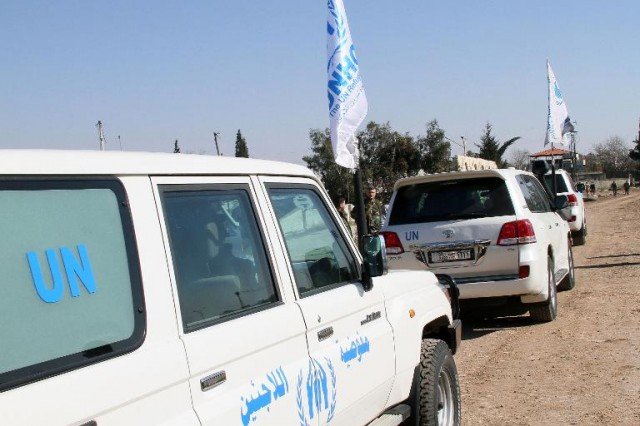
The UN has restarted its aid mission in the besieged rebel-held Old City of Homs
Red Crescent vehicles were attacked on their way to the Old City at the weekend, and their workers were briefly trapped.
Government troops have besieged Homs for 18 months.
Evacuations over the weekend were facilitated by a three-day truce, which was then extended until Wednesday.
But the operation was suspended on Tuesday because of what UN and Syrian officials said were logistical reasons.
Homs governor Talal Barazi said the temporary truce could be extended further if necessary.
UN agencies have also expressed concern over the fate of dozens of men who were taken in by Syrian security personnel after they fled Homs.
UN rights spokesman Rupert Colville said it was “essential that they do not come to any harm”.
The detainees were being held at an abandoned school, the UN said.
The Syrian authorities said the screening was necessary to weed out “terrorists”.
[youtube jdby_ebt-ho 650]
More than six hundreds civilians have been evacuated from the rebel-held Old Quarter of Homs, Syria, state media report.
This was despite mortar fire and shooting which activists say killed several people and wounded others.
UN and Syrian Red Crescent teams also managed to deliver relief supplies to the quarter, which has been besieged by government forces for more than a year.
On Saturday aid workers were trapped under fire there for several hours.
The Wall Street Journal‘s Sam Dagher, in Homs, has tweeted that more than a dozen men who came out with the evacuees were detained by security forces and taken away to an unknown location.
Sunday is the final day of what was agreed as a three-day humanitarian truce.

More than six hundreds civilians have been evacuated from the rebel-held Old Quarter of Homs
The governor of Homs, Talal al-Barazi, has said the ceasefire may be extended by a further three days, to allow all those who might want to leave the chance to do so.
Elsewhere, opposition activists said at least 11 people were killed in the northern city of Aleppo when government helicopters dropped barrel bombs – crude weapons comprising cylinders packed with explosives and metal fragments – on rebel-held neighborhoods.
The operation to help trapped civilians in Homs was the one concrete agreement reached at recent peace talks in Geneva, which are due to resume on Monday.
A UN/Red Crescent aid convoy came under attack from mortars and gunfire as it was leaving Homs on Saturday.
Syrian authorities have blamed the attack on rebels, but they in turn say that President Bashar al-Assad’s forces were responsible for the incident.
UN humanitarian chief Valerie Amos has insisted that the UN and aid agencies will not be deterred by the weekend’s violence.
The Red Crescent, in a joint operation with the UN, is trying to deliver food, water and medicine by truck to some 3,000 civilians in rebel-held areas.
Homs has been a key battleground in the uprising against President Bashar al-Assad.
[youtube kRNreOCdDN8 650]
A UN aid convoy bringing supplies into the besieged district of the central Syrian city of Homs has come under fire, leaving at least one person hurt.
Renewed fighting in the city had already slowed bids to bring in relief supplies.
The Syrian Red Crescent said its vehicles were fired on, and that one of its drivers was wounded.
However, Syrian state media said four Red Crescent aid workers were wounded by rebel gunfire.
The UN is overseeing efforts to deliver food, water and medicine by truck to some 3,000 civilians in rebel-held areas.
The government and rebels accused each other of violating a ceasefire after mortar fire on Saturday morning delayed an earlier attempt to bring in aid.

A UN aid convoy bringing supplies into the besieged district of the central Syrian city of Homs has come under fire, leaving at least one person hurt
On Friday, the first day of the agreed three-day ceasefire, more than 80 children, women and elderly people were evacuated.
Many of those evacuated on Friday looked frail and described extreme hardships inside the area, which has been under army siege for nearly a year-and-a-half.
They said bread had not been available for months, and many residents were gathering weeds and leaves to eat.
Relief officials had earlier warned that this second phase of the humanitarian operation, to allow aid into the embattled quarter, was particularly delicate, not least because the government side has always been reluctant to see supplies going in to rebel-held areas.
If the aid does reach the city, the next step would be another day of evacuations.
During Friday’s operation, vulnerable civilians such as children, old people and medical cases were brought out of the besieged area, sometimes carried by Red Crescent volunteers.
They told journalists that there were more people trapped in the city who had wanted to leave.
Homs has been a key battleground in the uprising against President Bashar al-Assad.
[youtube ctG4GccQPaQ 650]
Syria’s government and opposition have traded insults after a week-long peace conference in Geneva ended with no firm agreement.
Foreign Minister Walid Muallem said the opposition representatives were immature, while the opposition’s Louay Safi said the regime had no desire to stop the bloodshed.
However, UN envoy Lakhdar Brahimi said he had seen some “common ground”, and scheduled more talks for February 10.
The opposition has agreed to take part, but Walid Muallem refused to commit.
“We represent the concerns and interests of our people. If we find that [another meeting] is their demand, then we will come back,” he told reporters.
He railed at the opposition, saying they had tried to “implode the conference” by insisting that the government hands power over.
Louay Safi said the opposition would not sit in talks “endlessly”, and urged the government to “talk seriously about transferring power”.
Opposition leader Ahmed Jarba said he and his colleagues had “stood up to the regime, a regime that only knows blood and death”.

Lakhdar Brahimi is optimistic despite slow progress at Geneva talks on Syria
The two sides discussed humanitarian issues and possible ways to end the violence.
They made some agreements on local ceasefires to allow access for humanitarian workers.
UN aid chief Valerie Amos said the deals had allowed some aid to get through to a few thousand families.
But she said that, so far, an agreed ceasefire in the besieged city of Homs had not had any effect, and no aid has got through.
Parts of Homs have been under government siege for more than 18 months. More than 100,000 people have died in Syria since the uprising against President Bashar al-Assad began in March 2011.
Lakhdar Brahimi said: “Progress is very slow indeed, but the sides have engaged in an acceptable manner. This is a very modest beginning, but it is a beginning on which we can build.”
Though the gap between the two sides was “wide”, they had become used to sitting in the same room, he said.
“There have been moments when one side has even acknowledged the concerns and difficulties of the other side,” he said.
The first round of talks between the government and the opposition National Coalition began last week.
Both sides agreed to use a 2012 document known as the Geneva Communiqué as a basis for discussions, and agreed to meet in the same room.
But neither side could agree on the focus, with the opposition insisting that political transition was the focus, and the government wanting to talk about terrorism.
Diplomats described the atmosphere between the two sides as extremely tense all the way through the conference.
[youtube tsGlR8-Pduo 650]
UN mediator at the Geneva peace talks Lakhdar Brahimi has announced that Syria will allow women and children to leave the besieged area of Homs “from now”.
Syrian Deputy Foreign Minister Faisal Mekdad said women and children were free to leave. He alleged armed groups were preventing them from leaving.
Lakhdar Brahimi said that the opposition had agreed to give the government lists of detainees held by armed groups.
He said it was “too early” to assess the prospects of a comprehensive deal.
Lakhdar Brahimi admitted the talks were proceeding slowly but said that on Monday he “expected the two parties to make some general statement about the way forward”.
The envoy said he hoped a humanitarian convoy from the UN and the Red Cross would be able to go to Homs on Monday.
Hundreds of people are reportedly trapped in besieged parts of the city, including some who are very ill.

Syria will allow women and children to leave the besieged area of Homs
Faisal Mekdad said he hoped arrangements could be made with local officials to allow the convoy access but that the aid must not fall into “the hands of terrorists”, the term Syrian officials for all armed opposition.
Lakhdar Brahimi said that the government would allow women and children to leave immediately but had asked for a list of adult male civilians who wanted to leave to ensure they were not fighters.
The envoy said the opposition had pledged to gather names of detainees from groups it had “authority over or contact with” but admitted that this did not include all anti-government groups fighting in Syria.
The opposition in turn has been asking for the release of thousands of prisoners in government detention.
Lakhdar Brahimi said the talks in Geneva had taken the form of a joint session with the government and opposition in the morning before he met the sides separately in the afternoon.
He added that he expected this pattern to be repeated on Monday.
Lakhdar Brahimi said he had been encouraged by the atmosphere at the talks on Sunday, saying they had been characterized by “respect and exchange”.
No direct words had been exchanged between the delegations but the two sides were talking to each other through him, Lakhdar Brahimi said.
[youtube Y66-FQNUATc 650]
Syrian government and opposition representatives have met briefly face to face in Geneva in what is being hailed a small but significant step in talks aimed at “saving Syria”.
The initial gathering in Geneva lasted half an hour mediated by the UN’s Lakhdar Brahimi.
Delegates in Geneva are aiming at small concessions, not a full peace deal.
“Ending terrorism and violence” is the top priority, Syrian officials say. They insist it is too early to discuss President Bashar al-Assad’s position.
The two delegations filed in through separate doors into one room in the UN Geneva Headquarters, and sat down at the same U-shaped table, but said nothing to each other.
Lakhdar Brahimi spoke for half an hour. Then they all filed out again.
Ahead of the next face-to-face meeting, Lakhdar Brahimi will shuttle between the delegations, trying to build confidence with small achievements like localized ceasefires, release of detainees and the opening of humanitarian corridors.
There is hope that minor progress will pave the way for the discussion of wider issues like political transition next week, although there has been no sign of common ground on this so far.
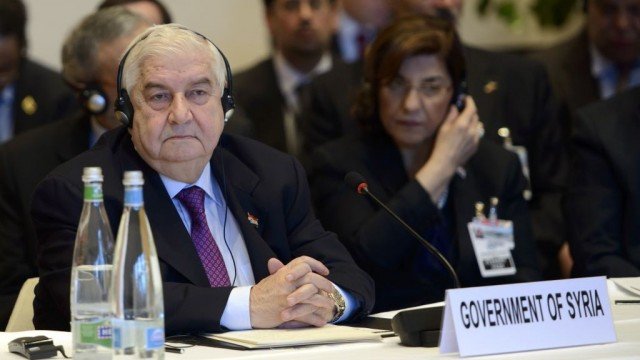
Syrian government delegation has said the main issue of the Geneva talks is finding a solution to foreign-backed terrorism
Shortly after the initial meeting, the chief of staff to the leader of Syria’s National Coalition, Monzer Akbik, claimed that the transition process had started in earnest.
“Today we had the chance to speak directly to regime… You know dictators usually, they don’t like to listen. But today they had to listen to us and to the voice of the Syrian people that they want transition from dictatorship to democracy.”
However Syria’s Ambassador to the UN Bashar Jafari – part of the government delegation – said it was “too early” to talk of President Bashar al-Assad stepping down and that the issue was “not the priority”.
“Item number one should be putting an end to the terrorism and to the violence,” he said.
The envoy said the common ground between the parties “should be that we should talk about everything, everything, without any selectivity… and no preconditions and no hidden agendas”.
But he accused the coalition delegation of harboring “personal hatreds towards the government for whatever reasons”.
The opposition and government are fundamentally divided over the aims of the conference.
The government delegation has said the main issue of the talks is finding a solution to foreign-backed “terrorism”, by which it means the whole of the armed opposition.
The opposition, however, had insisted that the regime commit in writing to the 2012 Geneva I communiqué, which called for a transition process.
The communiqué urged Syria to form a transitional governing authority that “could include members of the present government and the opposition and other groups”.
Syria’s civil conflict has claimed well over 100,000 lives since it began in 2011.
[youtube WQqfflu5cdY 650]
Syrian government and opposition have traded bitter accusations on the first day of a major peace conference in Geneva, Switzerland.
The opposition and US said President Bashar al-Assad had no legitimacy and must step down from power.
Syria’s foreign minister had a terse exchange with the UN’s Ban Ki-moon over the length of his speech and said only Syrians could decide Bashar al-Assad’s fate.
The conflict has left more than 100,000 dead and millions displaced.
The summit is discussing the Geneva communiqué which lays out a political transition plan for Syria.
Wednesday’s initial meeting, involving speeches from 40 or so foreign ministers – has now ended. The direct talks are scheduled to begin in Geneva on Friday.
At a fractious evening news conference, during which there were repeated calls for calm, Ban Ki-moon spoke of the suffering in Syria, saying: “Enough is enough. The time has come to negotiate.”
He said that “the really hard work begins on Friday”, adding: “We have a difficult road ahead, but it can be done and it must be done.”
Ban Ki-moon dwelt on the Geneva communiqué, which calls for a transitional government in Syria, saying he was disappointed with the attitudes of both the Syrian government and its ally, Iran.
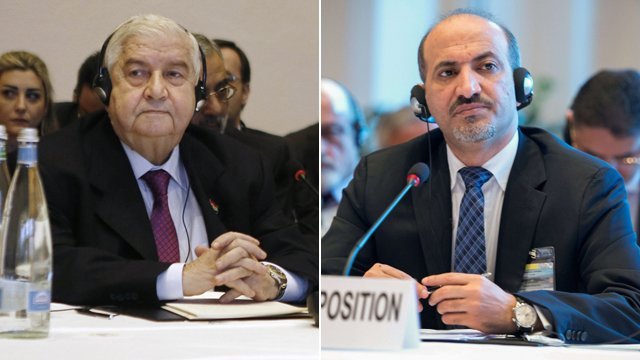
Syrian government and opposition have traded bitter accusations on the first day of a major peace conference in Geneva
UN mediator Lakhdar Brahimi said he would speak to the Syrian government and opposition delegations separately on Thursday and that he hoped both teams would meet in the same room on Friday.
This would be the first face-to-face meeting between the Syrian government and the main opposition – the National Coalition – since the conflict began in 2011.
At his press conference, Secretary of State John Kerry stressed that the Geneva communiqué and its call for political transition was the paramount focus of the summit.
“Every delegation, with one exception, embraced the Geneva communiqué,” John Kerry said, referring to the Syrian government.
“No-one has done more to make Syria a magnet for terrorists than Bashar al-Assad,” he said.
“You cannot save Syria with Bashar al-Assad in power.”
A member of the Syrian team, UN ambassador Bashar Jaafari, criticized the exclusion of Iran from the meeting, and condemned many of Wednesday’s speeches as “provocative and repetitive statements based on hatred towards the Syrian government”.
He also accused Gulf states of “inciting terrorism” in Syria.
Syria’s Foreign Minister Walid Muallem said some states attending the talks had “Syrian blood on their hands” and called the opposition “traitors”.
[youtube _WIEaTawzJo 650]
Syria’s Foreign Minister Walid Muallem has said Damascus is ready to offer a prisoner exchange with rebels.
Speaking in Moscow, Walid Muallem also said he had presented a ceasefire plan for the second city Aleppo to his Russian counterpart, Sergey Lavrov.
The moves came as the opposition Syrian National Coalition meets in Istanbul to decide whether to go to next week’s peace conference.
The coalition is under Western pressure to participate in the Geneva II talks.
However, many of its members have already pulled out.
Some are reluctant to go unless Syrian President Bashar al-Assad is excluded from any transitional government, but Damascus says there should be no pre-conditions for the talks.
Meanwhile Lebanese security officials said rockets fired from Syria had hit the Lebanese border town of Arsal, killing at least six people, among them at least one child, and injuring at least 15.

Speaking in Moscow, Walid Muallem said he had presented a ceasefire plan for the second city Aleppo to his Russian counterpart, Sergey Lavrov
Arsal, in the Bekaa valley, is predominantly Sunni and its residents have been broadly supportive of the Sunni-dominated uprising against President Assad, whose Alawite sect is an offshoot of Shia Islam.
It has been flooded with refugees since the Syrian military launched an offensive nearby in November.
The three-year conflict has claimed more than 100,000 lives.
An estimated two million people have fled the country and some 6.5 million have been internally displaced.
Walid Muallem said he was ready to exchange lists of prisoners.
“I informed Lavrov of our principled position in favor of an agreement to exchange those held in Syrian prisons for those taken by the other side,” he said.
“We are ready to exchange lists and develop the necessary mechanism for accomplishing these goals.”
The Syrian foreign minister added that he had given Russia a ceasefire plan for Aleppo, which he said he wanted to “serve as an example to other towns”.
But correspondents say it remains far from clear that even a partial ceasefire could be achieved.
On Thursday, the two foreign ministers held talks with Iranian officials.
Sergey Lavrov said there was “no hidden agenda” to their meeting.
“This does not mean that we have some tri-party (peace) draft,” he told reporters.
The first Syrian chemical weapons are leaving the country on a Danish ship.
The vessel left the northern Syrian port of Latakia on Tuesday, escorted by Russian and Chinese warships.
Removing the most dangerous chemicals is the first step of an UN-backed deal to eliminate Syria’s chemical arsenal.
A previous bid to collect the materials was aborted after Syrian officials failed to deliver the toxic chemicals to the collection point in Latakia.
The hazardous cargo is due to be taken to Italy, where it will be loaded onto a US Navy ship and shipped to international waters for destruction in a specially created titanium tank on board.
The mission is being run jointly by the UN and the Organization for the Prohibition of Chemical Weapons (OPCW).
The agreement was brokered by the US and Russia after rockets filled with the nerve agent sarin was fired at three towns in the Ghouta agricultural belt around the Syrian capital Damascus on 21 August.
Hundreds of people were killed in the attacks.

The first Syrian chemical weapons are leaving the country on a Danish ship
Western powers said only Syrian government forces could have carried out the assault, but President Bashar al-Assad blamed rebel fighters.
In a statement on Tuesday, the UN confirmed that a small number of containers with “priority one chemical materials” were on board the Ark Futura cargo ship, one of two vessels in charge of collecting the materials.
They will wait in international waters for additional chemicals to be delivered to Latakia for collection.
A spokeswoman said the loading took only “a couple of hours”, but this delicate phase of the operation had been “months in the planning”.
The OPCW did not disclose what percentage of Syria’s toxic arsenal – around 1,300 tonnes of weapons and precursors – had been removed.
The toxic materials were supposed to have been removed by December 31st, but the deadline was missed because of heavy fighting and the presence of opposition groups along the main road between Damascus and Latakia.
The complete elimination of all chemical weapons material and equipment must be completed by June.
The “most critical” chemicals include about 20 tonnes of the blister agent sulphur mustard.
How the plan will unfold:
- The Syrian authorities are responsible for packing and safely transporting the chemical weapons from 12 sites across the country to the port of Latakia. Russia has supplied large-capacity and armored lorries, while the US has sent container drums and GPS locators.
- Russia will provide security for loading operations at Latakia, for which the US has supplied loading, transportation and decontamination equipment. China has sent 10 ambulances and surveillance cameras, and Finland an emergency response team in case of accidents.
- Denmark and Norway are providing cargo ships and military escorts to take the chemicals to an as yet unnamed port in Italy. Russian and China will also provide naval escorts.
- In Italy, the “most critical” chemical agents will be loaded onto the US Maritime Administration cargo ship, MV Cape Ray, to be destroyed by hydrolysis in international waters. Less-toxic chemicals will be shipped by Norwegian and Danish vessels for disposal at commercial facilities.
Pope Francis has received a private message from Syria’s President Bashar al-Assad, the Vatican said on Saturday, without disclosing its contents.
It was the first known time Bashar al-Assad has sent a direct message to the Pope since the start of Syria’s civil war in 2011.
Pope Francis has made numerous appeals for an end to the conflict, the latest on Christmas Day.
Vatican sources said the message likely included the Syrian government’s position ahead of peace talks due to start on January 22nd under UN auspices in Geneva.
The Vatican, which has permanent observer status at the United Nations, also has a representative to UN organizations in Geneva.

Pope Francis has received a private message from Syria’s President Bashar al-Assad
It also said a delegation headed by Joseph Sweid, a Syrian minister of state, held talks in the Vatican with Pope Francis’ secretary of state, Archbishop Pietro Parolin and his foreign minister, Archbishop Dominique Mamberti.
“The delegation brought a message from President Assad for the Holy Father and illustrated the position of the Syrian government,” a statement said.
Syria’s civil war between forces loyal to Bashar al-Assad and mostly Sunni Muslim rebels fighting to topple him has killed more than 100,000 people since March 2011.
The Vatican is also keen to have information on the fate of Father Paolo Dall’Oglio, a Jesuit priest who supported the rebels and disappeared in July in eastern Syria.
[youtube ASN4cPUl2wo 650]
Syrian refugee camps in Lebanon have been hit by a fierce winter storm, the UN say.
There has been snow, rain, high winds and freezing temperatures in the north of the country and the Bekaa Valley, home to more than 200 informal camps.
The UN High Commissioner for Refugees (UNHCR) said it was “working harder than ever” to protect the more than 800,000 Syrians sheltering in Lebanon.
The Lebanese army is helping distribute emergency kits, including blankets.
“We are worried, because it is really cold in the Bekaa region, and we’re extremely worried about the refugees living in makeshift shelters, because many are really substandard,” UNHCR spokeswomen Lisa Abou Khaled told the AFP news agency.
At least 80,000 refugees will have to spend the winter in tents. Many others are living in unfinished or unheated buildings with only slightly more protection.

Syrian refugee camps in Lebanon have been hit by a fierce winter storm
Lisa Abou Khaled said the UNHCR had stockpiles of items to help refugees whose shelters might be damaged or destroyed, including plastic sheeting, floor mats, blankets and mattresses. Supplies have also been given to local councils.
“The Syrian refugees here are shivering with cold, especially the ones in tents,” said Wafiq Khalaf, a councilor in Arsal, a town in the northern Bekaa Valley that has seen 20,000 people arrive in the past few months.
“Water has come into the tents from the roofs, and from the ground where there is flooding,” he told AFP.
“At the moment there is more than 10cm [3.9in] of snow on the ground, but more is expected.”
Forecasters are predicting between 7.6cm and 13cm of snow in total.
The latest warning comes after the UNHCR announced on Tuesday that it would be airlifting food and other aid items into northern Syria from Iraq for the first time.
Twelve planeloads of supplies will be flown in over the next few days, ahead of what the UN fears will be the region’s harshest winter in a century.
The decision was made after land convoys were shot at, harassed, and detained at check points, officials said.
Almost 2.3 million Syrians have fled into neighboring countries since the uprising against President Bashar al-Assad began in March 2011, according to the UN. There are also an estimated 6.5 million internelly displaced people (IDP’s) inside Syria, and many more in need of aid.
[youtube 1WK24lGV4bw 650]
The US and UK have decided to suspend all “non-lethal assistance” for Syrian rebels.
A US embassy spokesman in Ankara said the decision was made after Islamist rebels seized bases belonging to the Western-backed Free Syrian Army (FSA).
Fighters from the Islamic Front, a new alliance of major rebel groups, took control of the bases at the Bab al-Hawa border crossing with Turkey last week.
Humanitarian assistance by the US and UK is not expected to be affected.
That was distributed through international and non-governmental organizations, the US embassy spokesman added.
Last month, seven leading rebel groups – the Ahrar al-Sham, Jaysh al-Islam, Suqour al-Sham, Liwa al-Tawhid, Liwa al-Haqq, Ansar al-Sham and the Kurdish Islamic Front – declared that they were forming the largest alliance yet in the 33-month conflict, with an estimated 45,000 fighters.
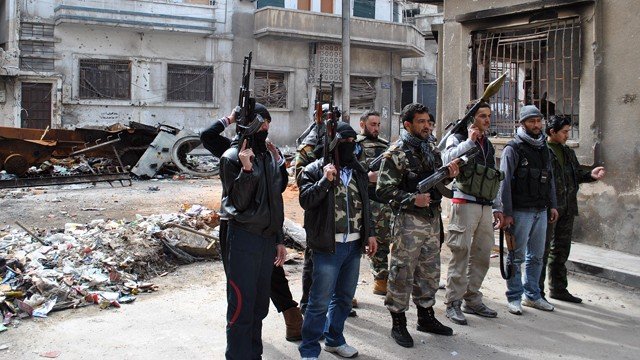
Fighters from the Islamic Front, a new alliance of major rebel groups, took control of the bases at the Bab al-Hawa border crossing with Turkey
They said the new Islamic Front was an “independent political, military and social formation” that aimed to topple President Bashar al-Assad’s government and build an Islamic state.
The front does not include al-Qaeda affiliates like the Islamic State in Iraq and the Levant (ISIS) and the al-Nusra Front, but its charter welcomes “muhajirin”, or foreign fighters, as “brothers who supported us in jihad”, and suggests it is willing to co-operate with them.
Last week, the Islamic Front announced that it had withdrawn from the command of the FSA’s Supreme Military Council (SMC), which is aligned to the opposition National Coalition.
Four days later, its fighters drove out SMC-aligned forces out of their bases and warehouses at Bab al-Hawa, in the north-western province of Idlib, which contained weapons and equipment that had been brought into Syria through Turkey.
SMC spokesman Louay Meqdad said the Islamic Front had raised its flag in place of the SMC’s after “asking” its personnel to leave. But he also stressed: “We believe that those brigades are our brothers, that they know that we are not the enemy.”
On Wednesday, the US embassy spokesman told the Reuters news agency that the situation at Bab al-Hawa was being investigated to “inventory the status of US equipment and supplies provided to the SMC”.
The US government has committed to provide $250 million in non-lethal assistance to the National Coalition, local opposition councils and the SMC. Rebel brigades have been provided with food rations, medical supplies, communications equipment and vehicles.
Top Syrian rebel commander Abdul Qadir al-Saleh has died of wounds he sustained in a government air strike on a rebel-held air base near Aleppo on Thursday, reports say.
Abdul Qadir al-Saleh, the leader of Liwa al-Tawhid, died overnight, a spokesman told the Associated Press.
Abdul Aziz Salama, the brigade’s political leader, had assumed overall command, the spokesman added.
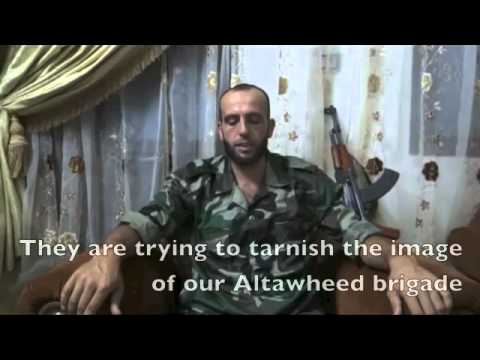
Abdul Qadir al-Saleh has died of wounds he sustained in a government air strike on a rebel-held air base near Aleppo
Opposition activists had said Abdul Qadir al-Saleh, also known as Hajji Marea, was in a good condition in hospital last week.
Liwa al-Tawhid (Battalion of Monotheism) was formed in July 2012 to unite the many separate fighting groups operating in the Aleppo countryside. Later that month, it led a rebel offensive on the city of Aleppo.
Liwa al-Tawhid is now one of the main forces operating in the province, and is estimated to have between 8,000 and 10,000 fighters.
In January, it joined the Syrian Islamic Liberation Front (SILF), an alliance of Islamist rebel groups that recognizes the Western-backed Supreme Military Council of the Free Syrian Army but not the National Coalition.
[youtube Yf2ZfH0yDfM 650]
 Prev1...345...7Next
Prev1...345...7Next  Page 4 of 7
Page 4 of 7

























